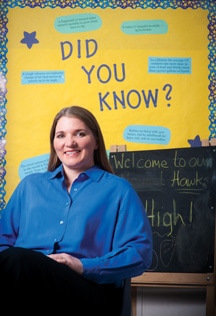 Dr. Renee Foose started her job as Superintendent of Howard County schools on July 1, after serving as Deputy Superintendent of Baltimore County Public Schools. In her two decades working in education, Dr. Foose has led numerous initiatives to help close the achievement gap while preparing students for college and the workforce.
Dr. Renee Foose started her job as Superintendent of Howard County schools on July 1, after serving as Deputy Superintendent of Baltimore County Public Schools. In her two decades working in education, Dr. Foose has led numerous initiatives to help close the achievement gap while preparing students for college and the workforce.
INTERVIEW BY Martha Thomas PORTRAIT BY André Chung
Q What made you decide to go into education?
I started my teaching career in kind of a roundabout way. I always wanted to be a teacher, but I was at community college in Pennsylvania, and there was a table at a job fair. They were offering a free T-shirt if you filled out the form for the state police. I wanted the free T-shirt, but I also got a job.
Q With the police?
Yes, I took a bit of a detour with the state police to earn money for college. I worked for six years as a state trooper. I had a blast.
I was working with computer crimes and was making presentations to school administrators. I’d tell them my credentials, that I had a degree in education. A principal approached me from Baltimore County and told me she wanted me to teach science at Parkville High School.
I taught regular science for one year, and they asked if I could develop a forensic science program. That was long before CSI. The Discovery Channel had a show called the “Forensic Files”, you had to wait all month to watch it. By the time I left, 90 percent of my teaching load was forensic science. It was a huge draw.
From there, I accepted a position as assistant principle at Thomas Johnson High School in Frederick County, and then a position as principal in Washington County. It was a school that was getting ready to be taken over by the state, and we turned it around. This caught the attention of a superintendent in Montgomery County, so I went to Wood Middle School and implemented a comprehensive school reform. Then in December 2010, I got a call from Baltimore County to be deputy superintendent.
Q With your background in computers, it sounds like you were an early adapter to the new technology that is so important these days.
When you listen to people talk about the two camps: digital natives and digital immigrants, I tell them: “We brought it here.” I don’t consider myself a digital immigrant, I consider myself the forefather. Children today are hard-wired because we created that environment.
Q Does a conflict between the reliance on gadgets and face-to-face time influence your approach to children in schools?
It does. Social media is instant, constant communication. But that also causes a disconnect. With texting and tweeting, people are capturing everything in 140 characters or less. The last thing I want to see is students becoming increasingly disconnected from their teachers, and from the learning process, and increasingly connected to 140 characters or sound bites.
Q Is it up to the school to monitor students’ online behavior – especially when it comes to bullying?
It’s everybody’s job. One thing I know: What happens at home the night before, may not be talked about at home, but it will play itself out in the schoolhouse. A lot of Internet bullying that goes on the evening before is going to be discussed at school. It’s our job to be aware and to alert the appropriate people, to have conversations, to mediate these things at the earliest possible opportunity. Yes, we have a role in this. A big role. We’re probably going to know about it before parents.
Q What do you see as the biggest challenges in Howard County?
It’s a very high high-performing school system as measured by proficiency-based assessments. However, I do think there’s room for improvement. I’d like to see higher scores on voluntary assessments, such as SAT and the advanced placement; I would like to see more students involved in AP. I would like to see increased opportunities for our students who are living below the threshold of poverty or are minorities to those high level courses. Because these are predictive of college readiness and high wage workers upon leaving school.
Q Can you tell us about an experience that stays with you?
I could tell you story after story. There was a gal named Felicia, I was teaching earth science. It was around the time Cal Ripkin was going through his streak, in the mid-90s. He had passed Lou Gehrig, and every day we were counting. It was big stuff. Felicia had an attendance problem. She’d be there one day, not there the next. I started this little thing on the chalkboard, called “Felicia’s streak.” The deal was, if she made it every day for a marking period, 45 days, I was buying the whole class pizza. Felicia was there every single day. Now, what I do know is, she came to my class, I don’t think she made it to other classes. The support gathered around her was tremendous – students told her you have to be here tomorrow, they helped her with her schoolwork.
She passed science. What got her there was not the pizza party. It was the sense of belonging. I heard other conversations, kids encouraging her to come to other classes. She enjoyed the streak. I kept it up on the board for the rest of the year. When she came into class, I’d see her glance up at it. It’s about the relationship you build with students. I think to be a superintendent, you have to have those relationships.
Q Do you have any opinions about federal initiatives like No Child Left Behind and Race to the Top?
I think they have the potential to continue to demoralize. Race to the Top is a more relaxed version of No Child Left Behind, but the bottom line is with these programs, every child has to be to X by Y. We haven’t raised the bar, we’ve pulled the bar down. These assessments have their purpose. They serve their mean. But in the meantime, we’ve become so test-focused, fearing some consequence, we have a mindset of teaching to the test, and we do a disservice to our students.
Q What is your educational philosophy?
I’m about equity and about high achievement for all students every day. What does that look like? Giving the teachers all the resources they need to make sure students reach their potential. Right now in Howard County, there’s a 30-point gap in how well African American students do in relation to their white and Asian counterparts. My goal is to see all students achieve high levels.
Q We haven’t talked about you.
This is a 60-hour-a-week job. If you’re doing it in less than that, then you’re forgetting something.
Q So what does your kitchen look like?
All the wrappers are in the trash.
Q Seriously, what do you do in your free time?
I’m a wellness enthusiast. It’s important to stay focused and grounded. I like to work out. I’m a runner. I’ve run five marathons in the past. I run the halfs now. It’s hard to find the time to train. I like to read. I’m close to my family – I come from a big German family.
Q How does it feel to be the first female superintendent in Howard County?
I didn’t know I was the first female superintendent until I read about it in the paper. I’m honored, but it’s kind of surprising. It’s a female dominated profession and always has been, so it never dawned on me. I said, okay, oh well. But it’s kind of cool. Three teachers at school visits have said: Finally. *




